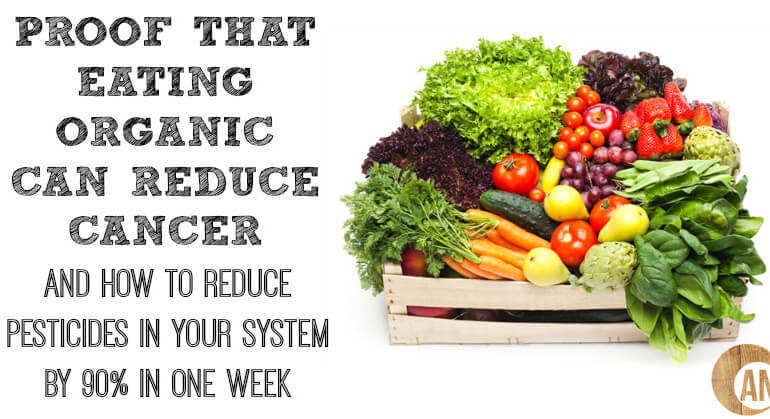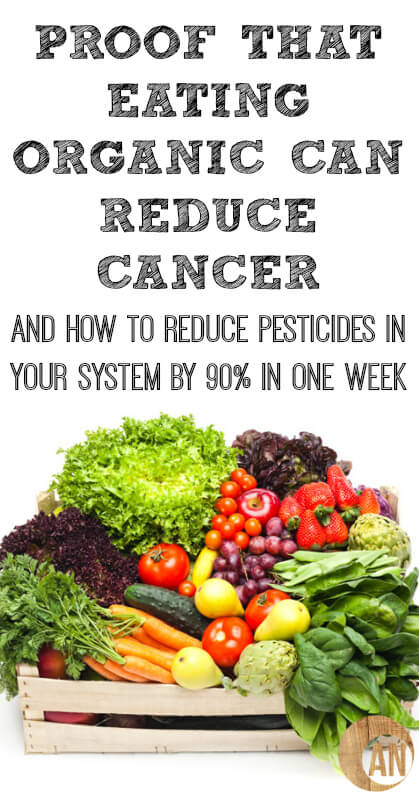
Despite the massive amount of evidence, some people refuse to believe that buying organic is a healthier option. I can’t be the only one whose ever been told that buying organic is a waste of money.
For some reason, a lot of people have this idea that conventionally grown produce is not only safe but just as good as organic food. I even had one guy tell me that eating organic is a complete scam and means nothing.
Well, let’s take a look at just a few things pesticides have been linked to:
Cancer
From the Department of Cancer Epidemiology at the Karolinska University Hospital,
In animal studies, many pesticides are carcinogenic, (e.g., organochlorines, creosote, and sulfallate) while others (notably, the organochlorines DDT, chlordane, and lindane) are tumor promoters. Some contaminants in commercial pesticide formulations also may pose a carcinogenic risk. In humans, arsenic compounds and insecticides used occupationally have been classified as carcinogens by the International Agency for Research on Cancer.
and from the College of Family Physicians of Canada
There is increasing controversy over the use of pesticides in the community. Studies looking at pesticide use and cancer have shown a positive relationship between exposure to pesticides and the development of some cancers, particularly in children.
Fertility
Results indicate that semen changes are multifactorial in the workers exposed to pesticides as there are numerous factors affecting sperm quality in occupational exposures. Majority of pesticides including organophosphoruses affect the male reproductive system by mechanisms such as reduction of sperm density and motility, inhibition of spermatogenesis, reduction of testis weights, reduction of sperm counts, motility, viability and density, and inducing sperm DNA damage, and increasing abnormal sperm morphology. Reduced weight of testes, epididymis, seminal vesicle, and ventral prostate, seminiferous tubule degeneration, change in plasma levels of testosterone, follicle-stimulating hormone (FSH), and luteinizing hormone (LH), decreased level and activity of the antioxidant enzymes in testes, and inhibited testicular steroidogenesis are other possible mechanisms. Moreover, DDT and its metabolites have estrogenic effects on males.
Parkinson’s
From the Department of Nutrition at Harvard,
Exposure to pesticides was reported by 7,864 participants (5.7%), including 1,956 farmers, ranchers, or fishermen. Individuals exposed to pesticides had a 70% higher incidence of PD than those not exposed (adjusted relative risk, 1.7; 95% confidence interval, 1.2-2.3; p = 0.002).
Childhood Cancer
A growing body of epidemiological evidence demonstrates associations between parental use of pesticides, particularly insecticides, with acute lymphocytic leukemia and brain tumors. Prenatal, household, and occupational exposures (maternal and paternal) appear to be the largest risks. Prospective cohort studies link early-life exposure to organophosphates and organochlorine pesticides (primarily DDT) with adverse effects on neurodevelopment and behavior.
These are just four instances out of thousands that prove pesticides are harmful. It’s literally impossible to disagree with the research that’s out there. The good news is that you can reduce the pesticides in your system in just one week.
How To Reduce the Pesticides In Your System In One Week
Eat organic food. Seems too simple, right?
Wrong.
Dr. Liza Oates from the School of Health Sciences in Australia performed a study that demonstrated how an organic diet, followed for one week, reduced pesticides by 90%. Here are the highlights of the study:
- Organophosphate pesticide exposure in Australian adults is mainly through the diet.
- One week of eating mostly organic food reduced urine pesticide levels by nearly 90%.
- The clinical relevance of reducing pesticide exposure requires further study.
- Eating organic food is a precautionary approach to reduce pesticide exposure.
So the next time someone tells you buying organic isn’t worth it, that organic food isn’t any healthier or that conventionally grown food is safe, just shove this article in their face. People love that.
It’s also important to note that this study was performed in Australia, where they are much stricter about what they will and will not allow in their food supply. America has much looser regulations, and as you likely know refuses to even label GMOs. So depending on your diet, it may take longer to rid your body of pesticides. The important part is that you recognize and make a concerted effort to eat organically, and locally if possible. Supporting organic food means more will be grown, and your money won’t go toward support farms that use pesticides.

Sources:
http://www.ncbi.nlm.nih.gov/pubmed/9498903
http://www.ncbi.nlm.nih.gov/pmc/articles/PMC2231435/#__ffn_sectitle
http://www.ncbi.nlm.nih.gov/pubmed/24487096
http://www.ncbi.nlm.nih.gov/pubmed/16802290
http://www.ncbi.nlm.nih.gov/pubmed/23184105
http://www.sciencedirect.com/science/article/pii/S001393511400067X
Original article and pictures take ancestral-nutrition.com site
Комментариев нет:
Отправить комментарий